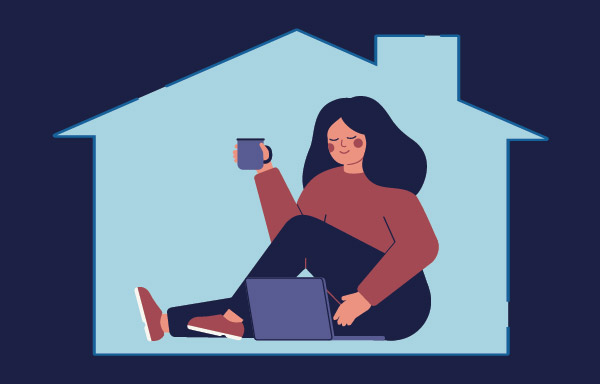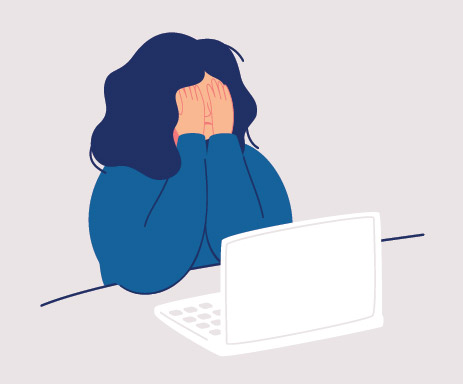Mental Health Tips for Working Remotely

COVID-19 has forced lawyers to work remotely. As many people are observing, this is not all bad. Working from home definitely has its advantages.
As an employee, you’ll save time and money by removing your daily commute, have more autonomy over your schedule, and get more done with fewer distractions (most of the time, anyway.) In turn, your employer saves on overhead costs and gains more options when it comes to hiring the best employees.
There is, however, a darker side to this working arrangement: Working remotely requires a great deal of discipline and has been known to cause a number of negative psychological effects, including feelings of isolation, stress, and depression.
In light of recent events, many companies are facing a reality in which some (if not all) of their employees are forced into a remote work situation. Because of this, it’s imperative to learn how to spot the signs of declining mental health so that you can take steps to overcome these negative effects.
Read on to learn more about the most commonly reported issues facing today’s remote workers, and how to combat them.
Loneliness and Isolation

Without a physical office to visit each day, social interaction tends to go out the window. It’s difficult to engage in casual watercooler-type chats and sling witty jokes over Slack: They just don’t translate well.
For those who thrive on social interaction, the disconnectivity from your coworkers (or from any group in general) may cause feelings of loneliness and isolation. These feelings can also be compounded if you happen to live alone.
So how can you overcome this?
One way is to rely more heavily on frequent video communications. While it’s quick and easy to converse via text, live video meetings will ultimately be more effective. Just make sure you look presentable.
Not only will you enjoy the visual (albeit virtual) presence of your colleagues, you’ll find that it’s just easier to communicate as a whole. It’s easier to interact with someone when you can see their face and read their body language. By physically seeing your team (not just hearing them), it will help foster a sense of trust and help nurture working relationships.
Pro Tip: Try to engage in some conversations that aren’t work-related. This can take the place of the metaphorical water cooler discussions that can also help foster working relationships. You do it when you’re in the office, so why not do it when you’re home? Just do your best to be mindful of your time and your colleagues’ time, and know when to end the conversation. This is key to maintaining productivity.
Craving more human interaction than what video chat can offer? If possible, consider working around other humans in a co-working space or coffee house at least once a week. Working around other people allows for networking and provides you the human interaction you’ve been craving (and perhaps some inspiration that you didn’t know you need.)
Stress and Anxiety

In a general office setting, it’s easy to manage your time. You clock in, clock out, and then head home. But when you work from your house, the line between work and home can begin to blur.
You may pressure yourself into being “always online and available” in order to maintain the appearance that you’re staying busy and productive. This can lead to you working more hours that can cut into your family or personal time.
You may also feel guilty about taking much-needed breaks during your workday. This guilt, in addition to the feeling of always needing to appear “on”, can become overwhelming, causing stress, anxiety, and mental burnout.
So how can you overcome these feelings?
Create a daily “heading to work” routine for yourself: Wake up at the same time each day, jump in the shower, get dressed, etc. This routine should include clearly-defined work hours to prevent procrastination and over-scheduling. Stick to this schedule as much as possible— no matter how tempting it might be to respond to a client’s email at 11 p.m.
It’s important to have a dedicated space in your house that is for work only. It could be an entire room, or a specific space within one room, like an office desk or a small corner of your living room. Your couch may be super comfortable, but distractions like watching the news or Netflix may be too tempting to keep you productive. You want an area that you can leave or walk away from when your workday is done to help clearly define your work and personal spaces both physically and mentally.
Also, make sure to take frequent breaks as you would if you were in an office setting. You may want to engage in household chores to help break up the day, like taking out the trash or emptying the dishwasher. If you need a nudge, set alarms on your phone to remind you to step away from your computer or phone. If you can, try to go for a walk outside and get some fresh air. And don’t feel guilty— consider breaks like these to be the at-home equivalent of taking a short walk to a colleague’s office or cubicle for a chat.
Depression

If you’re feeling stuck in your at-home working situation or experiencing the stress and anxiety mentioned earlier, it may lead to depression. Of course, it’s important to understand the symptoms of depression since it’s not just classified as a feeling of “sadness.”
According to The Mayo Clinic, depression symptoms can include:
- Angry outbursts, irritability, or frustration (even over small matters)
- Loss of interest or happiness in activities such as sex or hobbies
- Sleep disturbances, including insomnia and sleeping too much
- Tiredness and lack of energy, so even small tasks take extra effort
- Increased cravings for food
- Anxiety, agitation, and restlessness
- Trouble thinking, concentrating, making decisions, and remembering things
- Unexplained physical problems, such as back pain or headaches
- Often wanting to stay at home rather than going out to socialize or do new activities
If you feel that you’re suffering from one or a few of these symptoms, first understand that it’s okay not to be okay. The good news is, there are things you can do to combat feelings of depression.
What can be done to overcome feelings of depression?
Believe it or not, the simple act of getting dressed in the morning can do wonders for your mental health. It’s easy to get excited about the idea of remaining in your pajamas all day. But while our bodies enjoy the comfort of our jammies, our subconscious minds react to this by shutting down the practical parts of our brains.
Getting dressed to face the day does wonders to help keep you grounded in reality and limits the self-destructive behaviors of working from home. This small act of professionalism forces us into a mode of productivity and pushes us to get things done. Plus, if you work at home with a spouse, children, or other family members, your work attire can be a visual cue to let others know you’re “off-limits.”
Exercise, whether done in the morning or evening, can also work wonders to combat depression. You’ll not only get a rush of happiness-boosting endorphins, but you’ll give your brain a chance to recover from daily work issues. Bonus points if you can take your workout outside: Studies have shown that outdoor exercise has been associated with greater feelings of revitalization, increased energy, and decreases in tension, confusion, anger, and depression.
Last but not least, don’t be afraid to say “No.” It may seem enticing to take on as much work as you can if you’re working remotely, but you must remember you’re only human and there are only so many hours in the day. Understand your own limitations, respect the work schedule you have set for yourself, and don’t go beyond it. Just be sure to be polite and assertive to maintain respect from your clients and colleagues.
If you’re struggling with symptoms of depression, please remember there is always help available and you are not alone. If you need to talk, reach out to someone you trust or speak to a doctor. You can even receive online or virtual therapy sessions through certain healthcare providers or through services such as Talk Space.
Final Thoughts
Working remotely is not for everyone. For some, the isolation and self-induced stress may feel overwhelming, but hopefully the advice mentioned in this article can help maintain some semblance of normalcy during your time working from home. Just a few simple habits and environmental changes can help you to become more productive, connected and happy while working from home.
Share post:







